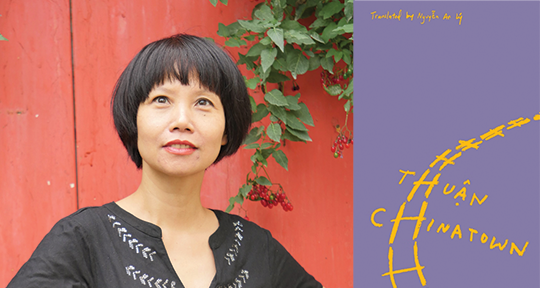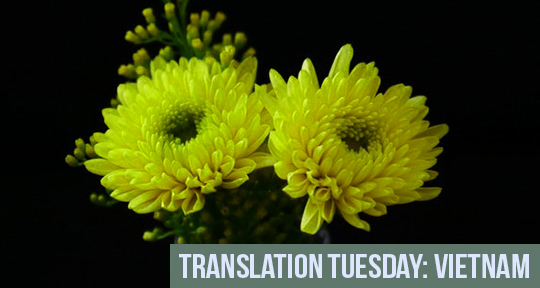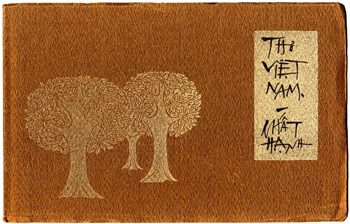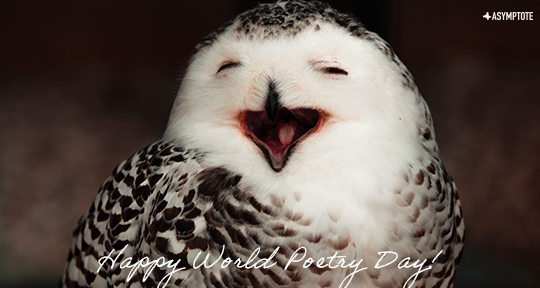In the finest of fictions, many worlds converge. All the maps the writer has walked through, all the sights seen and tasted, all that was heard and spoken. The work of lauded Vietnamese author Thuận exists in this potent amalgam of experience, bringing the poetry of hidden meanings to the surface with her singular perspective. In her Anglophone debut, Chinatown, translated by Nguyễn An Lý and soon to be published by Tilted Axis, Thuận paints a thinking portrait from the Paris metro to the streets of Chợ Lớn, a love story of trespasses and reimagined borders—fictions residing in fictions, life nestled in life. In this following interview, the author speaks to Phương Anh about Chinatown’s unique structure, how her work in French translation has informed her writing, and the complex political relationships informing her narratives.
Phương Anh (PA): Based on your previous interviews, it seems that rhythm is very important to you. When I was reading your writing, I was easily swept away by its cadence—could you speak to your process and style?
Thuận (T): I wanted this book to have one single rhythm, cut into three steady parts with two short breaks entitled “I’m Yellow”; I did this to both challenge and encourage the reader’s patience. I think my novels’ rhythms should attack the reader, confront them, suck them in. And when I’m feeling out the rhythm, I like to think of myself as trying to compose a piece of music.
Also, I wanted to find words that are concise and clear, with no hidden meanings, few adjectives, and generally without many embellishments. I use short sentences, one following another, utilizing space so the words may gain more strength. And then I would repeat—like small waves that come in every now and again, disappearing into the rock and sand. That’s how I approached writing Chinatown. The cadence, for the most part, is created by repetition—of a word group, a sentence, or even a whole passage. It could also be an action, a saying, a name.
PA: I feel that you really have a meticulous and, one could say, impersonal approach towards writing. For instance, in an interview with BBC Vietnam, you said that you don’t write to confess. What did you mean by that exactly?
T: I didn’t want the novel to become a memoir, but rather a direct experience of consciousness, taken from the disordered and persistent thoughts of the main character. For many people, writing is about opening up about oneself. At twenty-six, after ten years being away from home, I began to write. But not for the purpose of talking about my life. My first thought was to serve a desire, a fantasy, a need to escape from myself, from my life.
Here, the need to write informs the responsibility of writing. In other words, a writer becomes professional only when they can express, defend, and prove their attitude towards reality. For me, writing is difficult. Writing long is even more difficult. With novels, the number of pages itself is already a challenge. Not to mention the structure, style, rhythm, characters. . . I think of writing a novel as a dangerous adventure—the most dangerous thing being not knowing where it’s going to go.
PA: Besides being an author, you are also a translator, and a ruthless one at that. When editing the French translation of Thư gửi Mina, you cut out almost one fourth of the text, feeling that there was too much excess. Could you tell me why you decided to do so?
T: Thư gửi Mina is a novel with thirteen chapters, composed of letters written to Mina—a girl from the main character’s time in Soviet Russia. When writing that particular novel, I tried to write longer, sort of drifting from one story to another. In Vietnamese, I guess the result wasn’t too bad. But when I was editing the French translation, the language of Descartes helped me to realize that there were too many words—that it was an overkill. After editing out around twenty thousand words in the French edition, I took out the Vietnamese one again and revised it. Hopefully, Thư gửi Mina will be re-published with a different spirit: short and succinct, strong and direct, following the economical literary art that I’m pursuing.
PA: You also said that translation helped you to see your work more clearly, which I find quite refreshing in a way, because people tend to focus on what is “lost in translation”.
T: Whenever I have doubts about a sentence I’ve just written, I double-check it by translating it into French and immediately, anything illogical or superfluous will come out. If translation takes one thing from us, it makes up for it in other ways. READ MORE…














